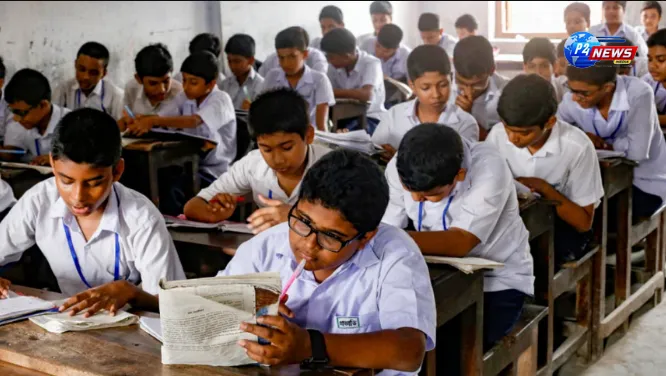The union government has abolished the 'no-detention policy' for grades 5 and 8 in its schools, enabling the failure of students who do not pass their year-end examinations, as confirmed by officials.
The union government has abolished the 'no-detention policy' for grades 5 and 8 in its schools, enabling the failure of students who do not pass their year-end examinations, as confirmed by officials.
Tamil Nadu has reaffirmed its commitment to maintaining the 'no-detention policy' for students up to the eighth grade, as expressed by School Education Minister Anbil Mahesh Poyyamozhi on Monday. This policy ensures that students are not held back based on their exam performance until they reach the eighth grade, fostering an inclusive educational environment.
The recent decision by the central government to allow schools to retain students in the same class, specifically for grades five and eight if they do not pass their examinations, has raised significant concerns. Minister Poyyamozhi highlighted that this shift could serve as a considerable barrier for children from less privileged backgrounds, ultimately hindering their opportunities for education. He emphasized that the potential ramifications of this new rule are regrettable, particularly for those who might struggle academically.
According to officials, the union government has officially eliminated the 'no-detention policy' for classes five and eight within schools under its jurisdiction. This change means that schools now have the authority to fail students who do not meet the necessary criteria to advance to the next class. In stark contrast, Tamil Nadu has decided to uphold its existing policy, remaining unaffected by the central government’s approach, except for institutions that specifically operate under its governance.
The Minister reassured parents, educators, and students alike that there is no cause for concern regarding changes in the educational framework within the state. Tamil Nadu’s administration is intent on maintaining the current system that promotes continuous learning and development without the fear of failing until the completion of eighth grade.
By adhering to the 'no-detention policy', the state aims to create a more supportive learning atmosphere, which is particularly crucial for young learners as they navigate the early stages of their educational journey. This commitment reflects a broader understanding of the challenges faced by students and their families, especially those from underprivileged backgrounds, who may not have access to the same resources and educational support as their more affluent peers.
Moving forward, the Tamil Nadu government will continue to advocate for policies that prioritize the educational rights of all children and aim to eliminate barriers to their academic success. The emphasis remains on ensuring that every student has the opportunity to progress and thrive in their educational pursuits without the fear of being held back due to exam performance.
The stance taken by Tamil Nadu sets a strong precedent in the ongoing discussions about educational reforms across India. It raises critical questions about equity, accessibility, and the long-term implications of educational policies that may disproportionately affect disadvantaged students.
The commitment to the 'no-detention policy' demonstrates a proactive approach in fostering a more inclusive educational landscape, paving the way for a system that recognizes the diverse needs and capabilities of all students in Tamil Nadu.
Like
Dislike
Love
Angry
Sad
Funny
Pray
'Trump Tracker: Tulsi Gabbard's Surprising Appointment as US Intelligence Chief
November 14, 20249th Ayurveda Day in Melbourne: A Celebration of Ayurvedic Innovations and Global Health Impact
November 10, 2024🍪 We Value Your Privacy and Experience Hi there! We use cookies to enhance your browsing experience, provide personalized content, and analyze site traffic. By continuing to use our site, you consent to our use of cookies.







Comments 0